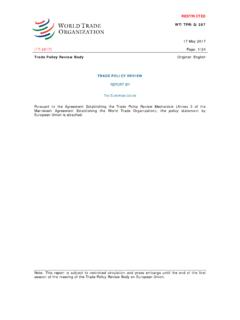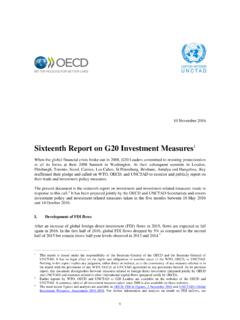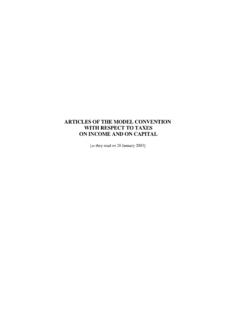Transcription of ARTICLE III NATIONAL TREATMENT ON INTERNAL …
1 PART II. ARTICLE III. NATIONAL TREATMENT ON INTERNAL . taxation AND REGULATION. I. TEXT OF ARTICLE III AND INTERPRETATIVE NOTE AD ARTICLE III .. 122. II. INTERPRETATION AND APPLICATION OF ARTICLE III .. 124. A. SCOPE AND APPLICATION OF ARTICLE III .. 124. 1. General .. 124. (1) Scope of ARTICLE III .. 124. (2) Purpose of ARTICLE III .. 125. (3) Relevance of tariff concessions .. 127. (4) Relevance of policy purpose of INTERNAL measures .. 127. (5) Relevance of trade effects .. 128. (6) Application of ARTICLE III to regional and local governments and authorities within the territory of a contracting 130. (7) Application of ARTICLE III with regard to State trading monopolies .. 131. (8) Mandatory versus discretionary legislation; non-enforcement .. 133. 2. Interpretative Note Ad ARTICLE III: measures imposed at the time or point of importation .. 136. (1) collected or enforced at the time or point of importation .. 136. (2) which applies to an imported product and to the like domestic product.
2 137. 3. Paragraph 1 .. 139. (1) should not be applied to imported or domestic products so as to afford protection to domestic production .. 139. (2) Note Ad paragraph 1: Application of paragraph 1 to INTERNAL taxes imposed by local governments and authorities .. 141. 4. Paragraph 2: INTERNAL taxes or other INTERNAL charges of any kind .. 141. (1) directly or indirectly .. 141. (2) INTERNAL taxes .. 141. (a) Excise taxes, indirect taxes and consumption taxes .. 141. (b) Fiscal measures versus enforcement measures .. 142. (c) Income taxes, exemptions from income taxes and credits against income taxes .. 144. (d) Border tax adjustments; border adjustment of taxes and charges .. 144. (3) or other INTERNAL charges of any kind : charges on the transfer of payments for imports or exports .. 149. (4) in excess of those applied .. 150. (a) Discriminatory rates of tax .. 150. (b) Methods of taxation .. 150. (c) Exemption or remission of 152. (d) Exposure of imported products to a risk of discrimination.
3 154. (5) like domestic products .. 155. (6) a directly competitive or substitutable product (Ad ARTICLE III paragraph 2) .. 159. (7) Taxes collected or enforced at the point of importation .. 161. 5. Paragraph 3 .. 161. 6. Paragraph 4 .. 162. (1) TREATMENT no less favourable .. 162. (a) Equality of competitive 164. (b) Formally identical legal requirements versus formally different legal requirements .. 168. (c) Application of legal requirements to individual cases and balancing .. 169. (2) than that accorded to like products of NATIONAL origin .. 171. (3) in respect of all laws, regulations and requirements .. 173. (a) Requirements applied in individual cases .. 173. (b) Subsidies and other benefits as requirements .. 173. (c) Requirements associated with the regulation of international investment .. 174. (4) affecting .. 175. (5) INTERNAL sale, offering for sale, purchase, transportation, distribution or use .. 177. (a) Standardization of products .. 177. (b) Minimum and maximum price regulations .
4 177. (c) Requirements affecting INTERNAL offering for 178. (d) regulations on quality or quantity of products consumed .. 179. (e) Marking requirements .. 181. (f) Measures affecting INTERNAL transportation .. 181. (6) differential INTERNAL transportation charges : second sentence of paragraph 183. 7. Paragraphs 5, 6 and 7: INTERNAL quantitative regulations (mixing regulations ) .. 183. 122 ANALYTICAL INDEX OF THE GATT. (1) Scope of paragraph 5 .. 183. (2) otherwise apply INTERNAL quantitative regulations in a manner contrary to the principles set forth in paragraph 1 .. 186. (3) Special customs TREATMENT granted conditional on mixing or use of the imported product with domestic products .. 187. (4) Application of mixing regulations in time of shortages .. 187. (5) Paragraph 6: existing mixing regulations and their 187. (6) Paragraph 189. (7) Relationship between provisions on mixing regulations and other provisions of ARTICLE III .. 189. 8. Paragraph 8 .. 190. (1) Paragraph 8(a): procurement by governmental agencies.
5 190. (a) governmental .. 191. (b) not with a view to commercial resale or with a view to use in the production of goods for commercial sale .. 193. (c) Tied loans .. 194. (2) Paragraph 8(b): payment of subsidies exclusively to domestic producers .. 194. 9. Paragraph 197. 10. Paragraph 10 .. 197. B. RELATIONSHIP WITH OTHER ARTICLES OF THE GENERAL AGREEMENT .. 197. 1. ARTICLE I .. 197. 2. ARTICLE 198. 3. ARTICLE 201. 4. ARTICLE XVII .. 204. 5. ARTICLE XX(d) .. 204. 6. ARTICLE XXIV:12 .. 204. 7. Part IV .. 204. C. EXCEPTIONS AND DEROGATIONS .. 204. 1. Exceptions to the scope of the NATIONAL TREATMENT requirement .. 204. 2. Protocol of Provisional Application .. 204. 3. Protocols of accession .. 205. III. PREPARATORY WORK AND SUBSEQUENT MODIFICATIONS .. 205. IV. RELEVANT I. TEXT OF ARTICLE III AND INTERPRETATIVE NOTE AD ARTICLE III. ARTICLE III*. NATIONAL TREATMENT on INTERNAL taxation and Regulation 1. The contracting parties recognize that INTERNAL taxes and other INTERNAL charges, and laws, regulations and requirements affecting the INTERNAL sale, offering for sale, purchase, transportation, distribution or use of products, and INTERNAL quantitative regulations requiring the mixture, processing or use of products in specified amounts or proportions, should not be applied to imported or domestic products so as to afford protection to domestic production.
6 *. 2. The products of the territory of any contracting party imported into the territory of any other contracting party shall not be subject, directly or indirectly, to INTERNAL taxes or other INTERNAL charges of any kind in excess of those applied, directly or indirectly, to like domestic products. Moreover, no contracting party shall otherwise apply INTERNAL taxes or other INTERNAL charges to imported or domestic products in a manner contrary to the principles set forth in paragraph 1.*. 3. With respect to any existing INTERNAL tax which is inconsistent with the provisions of paragraph 2, but which is specifically authorized under a trade agreement, in force on April 10, 1947, in which the import duty on the taxed product is bound against increase, the contracting party imposing the tax shall be free to postpone the application of the provisions of paragraph 2 to such tax until such time as it can obtain release from the obligations of such trade agreement in order to permit the increase of such duty to the extent necessary to compensate for the elimination of the protective element of the tax.
7 ARTICLE III - NATIONAL TREATMENT ON INTERNAL taxation AND REGULATION 123. 4. The products of the territory of any contracting party imported into the territory of any other contracting party shall be accorded TREATMENT no less favourable than that accorded to like products of NATIONAL origin in respect of all laws, regulations and requirements affecting their INTERNAL sale, offering for sale, purchase, transportation, distribution or use. The provisions of this paragraph shall not prevent the application of differential INTERNAL transportation charges which are based exclusively on the economic operation of the means of transport and not on the nationality of the product. 5. No contracting party shall establish or maintain any INTERNAL quantitative regulation relating to the mixture, processing or use of products in specified amounts or proportions which requires, directly or indirectly, that any specified amount or proportion of any product which is the subject of the regulation must be supplied from domestic sources.
8 Moreover, no contracting party shall otherwise apply INTERNAL quantitative regulations in a manner contrary to the principles set forth in paragraph 1.*. 6. The provisions of paragraph 5 shall not apply to any INTERNAL quantitative regulation in force in the territory of any contracting party on July 1, 1939, April 10, 1947, or March 24, 1948, at the option of that contracting party; Provided that any such regulation which is contrary to the provisions of paragraph 5 shall not be modified to the detriment of imports and shall be treated as a customs duty for the purpose of negotiation. 7. No INTERNAL quantitative regulation relating to the mixture, processing or use of products in specified amounts or proportions shall be applied in such a manner as to allocate any such amount or proportion among external sources of supply. 8. (a) The provisions of this ARTICLE shall not apply to laws, regulations or requirements governing the procurement by governmental agencies of products purchased for governmental purposes and not with a view to commercial resale or with a view to use in the production of goods for commercial sale.
9 (b) The provisions of this ARTICLE shall not prevent the payment of subsidies exclusively to domestic producers, including payments to domestic producers derived from the proceeds of INTERNAL taxes or charges applied consistently with the provisions of this ARTICLE and subsidies effected through governmental purchases of domestic products. 9. The contracting parties recognize that INTERNAL maximum price control measures, even though conforming to the other provisions of this ARTICLE , can have effects prejudicial to the interests of contracting parties supplying imported products. Accordingly, contracting parties applying such measures shall take account of the interests of exporting contracting parties with a view to avoiding to the fullest practicable extent such prejudicial effects. 10. The provisions of this ARTICLE shall not prevent any contracting party from establishing or maintaining INTERNAL quantitative regulations relating to exposed cinematograph films and meeting the requirements of ARTICLE IV.
10 Interpretative Note Ad ARTICLE III from Annex I. Any INTERNAL tax or other INTERNAL charge, or any law, regulation or requirement of the kind referred to in paragraph 1 which applies to an imported product and to the like domestic product and is collected or enforced in the case of the imported product at the time or point of importation, is nevertheless to be regarded as an INTERNAL tax or other INTERNAL charge, or a law, regulation or requirement of the kind referred to in paragraph 1, and is accordingly subject to the provisions of ARTICLE III. Paragraph 1. The application of paragraph 1 to INTERNAL taxes imposed by local governments and authorities within the territory of a contracting party is subject to the provisions of the final paragraph of ARTICLE XXIV. The term reasonable measures in the last- mentioned paragraph would not require, for example, the repeal of existing NATIONAL legislation authorizing local governments to impose INTERNAL taxes which, although technically inconsistent with the letter of ARTICLE III, are not in fact inconsistent with its spirit, if such repeal would result in a serious financial hardship for the local governments or authorities concerned.
















